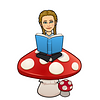Take a photo of a barcode or cover
I related to this more than I thought I would. It was a beautiful story involving an angsty teen and her perspective of the world.
I appreciated this powerfully-written glimpse into the life of a young Latinx American woman's experiences dealing with poverty, familial and cultural pressures, loss of a loved one, and her own unraveling emotions and depression that came about as part of her experiences facing all these things at once. While teenage Julia drove me crazy at times—she was admittedly really disrespectful and rude to almost everyone (while completely changing her tune for the cute boys she encountered)—by the end of the book I had a bit more grace for her as her mental health really began to unravel and we could see that she was kind of just falling apart.
Julia's relationship with her mom was particularly painful to read, as it seemed to be the strongest source of her anguish and self-loathing, highlighting the foundational importance of parents loving and accepting their children for who they are (instead of constantly blaming or shaming them for the pain or worry they're experiencing in their own lives as parents).
The mystery of who Julia's sister really formed an intriguing plot device to drive the story forward, along with the deep need for healing in her relationships with family. While I would probably only recommend this book for high school aged students or older (due to language and sexual content), there are still many powerful lessons to be learned about life, family, and cross-cultural upbringing.
Julia's relationship with her mom was particularly painful to read, as it seemed to be the strongest source of her anguish and self-loathing, highlighting the foundational importance of parents loving and accepting their children for who they are (instead of constantly blaming or shaming them for the pain or worry they're experiencing in their own lives as parents).
The mystery of who Julia's sister really formed an intriguing plot device to drive the story forward, along with the deep need for healing in her relationships with family. While I would probably only recommend this book for high school aged students or older (due to language and sexual content), there are still many powerful lessons to be learned about life, family, and cross-cultural upbringing.
When I first picked up this book, it annoyed me and I put it down. About a week ago, I picked it back up and I finished it quickly. Once I was able to get into the main character, I enjoyed the book so much more. Her mental health issues make this a book unlike others. Many teenagers (and beyond) struggle with mental health issues; this book allowed a space for those experiences and discussions. You can tell the author has written for Cosmopolitan based on much of what the main character thinks about. The snippet of the story that takes place in Mexico was actually my favorite part of the entire book--Julia connecting with her roots, her family.
Luckily, I have read some very good YA novels, this was not one of them. This is what I think I would have thought YA novels would be like. I found the narrator dramatic and annoying. And maybe the mother even more annoying. It had some special moments and I think a 14 year old would like it, but not an adult. I enjoyed some of the cultural aspects but I think the book tried to cover too many subjects. I’d like to edit the book to create two separate books. You cannot cover all the following subjects well in one YA novel: classism, racism, depression, a mystery, suicide, drug lords, rape, American dream, mother/daughter relationship, homophobia, Catholicism, illegal immigrants, first generation, virginity and love.
This was just ok for me. I understand that it is a YA book (which I normally love!) but I felt that the writing style was very elementary. I also thought that the book was kind of all over the place; it touched on a variety of topics, but did not give ample time to any of them.
This book got me out of a major book rut. What a fantastic story of a young woman growing up through adversity and trauma. It was a wonderful novel about family dynamics. I admire Julia’s strength.
dark
emotional
hopeful
inspiring
reflective
sad
medium-paced
Plot or Character Driven:
A mix
Strong character development:
Yes
Loveable characters:
Complicated
Diverse cast of characters:
Yes
Flaws of characters a main focus:
Yes
The first half can feel a bit slow at times, but by midpoint the book really hits its stride, both in terms of story and characters.
emotional
medium-paced
Plot or Character Driven:
A mix
Strong character development:
N/A
Loveable characters:
Complicated
Diverse cast of characters:
Yes
Flaws of characters a main focus:
Yes
This book was probably a tick under four stars for me, but I'm giving it four stars for effort. I wish I Am Not Your Perfect Mexican Daughter had been out when I was in high school, because I think it would have resonated with me a lot more back then. Reading it as an adult, with high school years behind me, I connected with the characters a bit less, even though I remember experiencing some of the same sentiments as Julia and her friends at that time.
In fact, at the beginning, Julia is not that likable of a character, which is a purposeful choice on Sánchez's part. It seems like a lot of reviewers had a hard time connecting with Julia because of this, but the reasons for Julia's moodiness become clear as the book unfolds. Her character is a realistic portrayal of how depression and anxiety can feel to the person experiencing them, and she does becomes more likable and sympathetic as the story goes on.
I Am Not Your Perfect Mexican Daughter is a fast read, but definitely not a light one, and it touches on a lot of heavy topics that I did not expect from just reading the book jacket: depression, suicide, rape, and of course the death of a sister (so, uh, trigger warning). These events aren't covered in great detail, but they are part of the narrative. In fact, I honestly wish Sánchez had gone into a little more depth on these topics; it bothers me when authors drop these really big issues into books to create drama, without fully exploring their consequences. But that's neither here nor there.
Overall, I felt like too much was happening in this story for every element to be given the narrative justice it deserved. Connor and Esteban felt more like plot devices that characters, and Olga's death (and the ensuing "mystery" it causes) felt more like a subplot than the spine of the narrative. This book ticked a lot of boxes for me — a female narrator, non-white main characters, a healthy view of treating mental illness, a positive stance on education, socioeconomic diversity, etc. — but it would have benefited from a strong editorial hand. I'll definitely still recommend this book to certain people, but with that caveat.
In fact, at the beginning, Julia is not that likable of a character, which is a purposeful choice on Sánchez's part. It seems like a lot of reviewers had a hard time connecting with Julia because of this, but the reasons for Julia's moodiness become clear as the book unfolds. Her character is a realistic portrayal of how depression and anxiety can feel to the person experiencing them, and she does becomes more likable and sympathetic as the story goes on.
I Am Not Your Perfect Mexican Daughter is a fast read, but definitely not a light one, and it touches on a lot of heavy topics that I did not expect from just reading the book jacket: depression, suicide, rape, and of course the death of a sister (so, uh, trigger warning). These events aren't covered in great detail, but they are part of the narrative. In fact, I honestly wish Sánchez had gone into a little more depth on these topics; it bothers me when authors drop these really big issues into books to create drama, without fully exploring their consequences. But that's neither here nor there.
Overall, I felt like too much was happening in this story for every element to be given the narrative justice it deserved. Connor and Esteban felt more like plot devices that characters, and Olga's death (and the ensuing "mystery" it causes) felt more like a subplot than the spine of the narrative. This book ticked a lot of boxes for me — a female narrator, non-white main characters, a healthy view of treating mental illness, a positive stance on education, socioeconomic diversity, etc. — but it would have benefited from a strong editorial hand. I'll definitely still recommend this book to certain people, but with that caveat.



